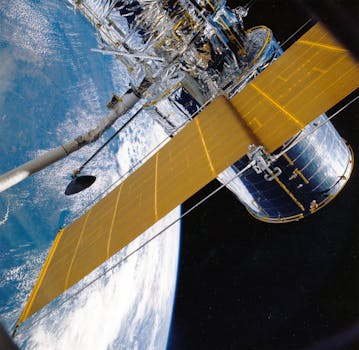The Future of Satellites: Revolutionizing Global Communication and Exploration

The Future of Satellites: Revolutionizing Global Communication and Exploration. The future of satellites holds great promise for revolutionizing global communication, space exploration, and beyond. With advancements in technology and decreasing costs, satellites are becoming increasingly accessible and versatile. In recent years, we have seen a significant increase in the number of satellite launches, with both government agencies and private companies launching satellites for a variety of purposes, including communication, navigation, and Earth observation.
One of the most significant trends in the future of satellites is the development of small satellites, also known as smallsats. These satellites are typically smaller and less expensive than traditional satellites, making them more accessible to a wider range of organizations and individuals. Smallsats are often used for applications such as Earth observation, communication, and technology demonstration. According to a report by MarketsandMarkets, the small satellite market is expected to grow from $2.8 billion in 2020 to $13.4 billion by 2025, at a compound annual growth rate (CAGR) of 24.6% during the forecast period.
In addition to small satellites, another trend in the future of satellites is the development of satellite constellations. These constellations are networks of satellites that work together to provide global coverage and connectivity. Satellite constellations have a wide range of applications, including communication, navigation, and Earth observation. For example, the Starlink constellation, developed by SpaceX, aims to provide high-speed internet access to remote and underserved areas around the world.
The Role of Satellites in Space Exploration
Satellites play a critical role in space exploration, enabling us to study the universe and explore new worlds. Satellites have been used to study the Earth, the Sun, the planets, and other celestial bodies, providing valuable insights into the formation and evolution of our solar system. In the future, satellites will continue to play a key role in space exploration, enabling us to study the universe in greater detail and explore new frontiers.
For example, the Curiosity Rover, which is exploring Mars, relies on satellites to communicate with Earth and transmit data back to scientists. The rover uses the Mars Reconnaissance Orbiter and the Mars 2020 satellite to communicate with Earth and navigate the Martian surface.
The Future of Satellite Technology
The future of satellite technology holds great promise for advancing our understanding of the universe and improving life on Earth. Advances in satellite technology are enabling the development of more powerful and efficient satellites, with improved capabilities for communication, navigation, and Earth observation. For example, the development of quantum technology is expected to revolutionize the field of satellite communication, enabling faster and more secure data transmission.
In addition to advances in satellite technology, the future of satellites will also be shaped by changes in the regulatory environment and the development of new business models. For example, the Federal Communications Commission (FCC) has implemented new regulations to facilitate the deployment of satellite constellations and promote the development of the satellite industry.
Challenges and Opportunities in the Future of Satellites
The future of satellites is not without its challenges and opportunities. One of the biggest challenges facing the satellite industry is the issue of space debris. As the number of satellites in orbit increases, so does the risk of collisions and the accumulation of space debris. This poses a significant threat to the safety and sustainability of space exploration and satellite operations.
Despite these challenges, the future of satellites holds great promise for advancing our understanding of the universe and improving life on Earth. The development of new satellite technologies and applications, such as satellite-based Internet of Things (IoT) and satellite-based Earth observation, is expected to create new opportunities for economic growth, environmental sustainability, and social development.
Conclusion
In conclusion, the future of satellites is a rapidly evolving field, with significant advancements in technology, applications, and regulatory frameworks. As we look to the future, it is clear that satellites will play an increasingly important role in shaping our world and advancing our understanding of the universe. Whether through communication, navigation, Earth observation, or space exploration, satellites have the potential to transform our lives and create new opportunities for economic growth, environmental sustainability, and social development.







